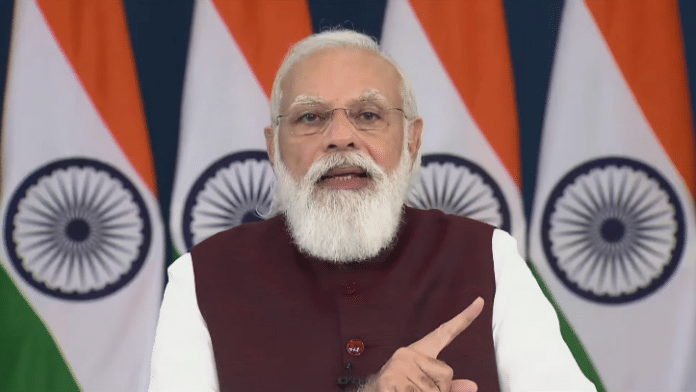New Delhi: The developments in Afghanistan have “increased the challenges of radicalisation”, Prime Minister Narendra Modi said Friday, referring to the Taliban takeover of the war-torn country.
Addressing the Shanghai Cooperation Organisation (SCO) Summit virtually, that is taking place at Dushanbe, Tajikistan, the PM exhorted member countries to activate and deploy counter-terrorism mechanisms that are laid out under the SCO Regional Anti-Terrorist Structure (RATS).
“The biggest challenges in this region (South and Central Asia) are linked with peace, security and trust-deficit and root cause of this is increasing radicalisation. The recent developments in Afghanistan have made it all the more clear,” Modi said.
Pushing the SCO to bring about a solid network against radical forces, Modi said the RATS mechanism of the grouping should be further activated and strengthened.
“Fighting radicalisation is not just needed for peace and mutual trust in the region but it is also needed for the future generation,” the PM said, adding that more innovative technologies are needed to be encouraged, referring to platforms like UPI, CoWin and others.
He said radicalisation has adversely impacted the economic potential of the region even as many areas such as intra-SCO trade have remained below potential.
The summit was chaired by the President of Tajikistan Emomali Rahmon.
‘Central Asia fundamental base for progressive cultures’
In his speech, PM Modi also reached out to the Tajiks calling them “brothers and sisters”. This assumes importance in the light of the fact that the new Taliban dispensation has been accused of not having an inclusive government, giving larger roles to the Tajiks, the Uzbeks and the Hazaras.
Evoking the Sufism form of Islam, Modi said, “If we look back at history, then we will see that the Central Asian region is the fundamental base for moderate and progressive cultures and values.”
He added, “Thus, Sufism has not only thrived in this region but it has also spread across the world.”
Modi said India and other SCO member countries — China, Russia, Kazakhstan, Kyrgyzstan, Pakistan, Tajikistan and Uzbekistan — encourage the tradition of “moderate, tolerant and inclusive” form of Islam.
He also said there is a need to connect the Central Asian region directly with the thriving Indian market. In this aspect he shed light on the need to promote projects like the Chabahar Project in Iran or the International North-South Corridor.
“Connectivity cannot be one-sided. Mutual trust, consultative approach and participatory nature should be there in building robust connectivity,” he added.
(Edited by Neha Mahajan)
Also read: India says doesn’t believe in ‘clash of civilisations’ but China must end Ladakh conflict






